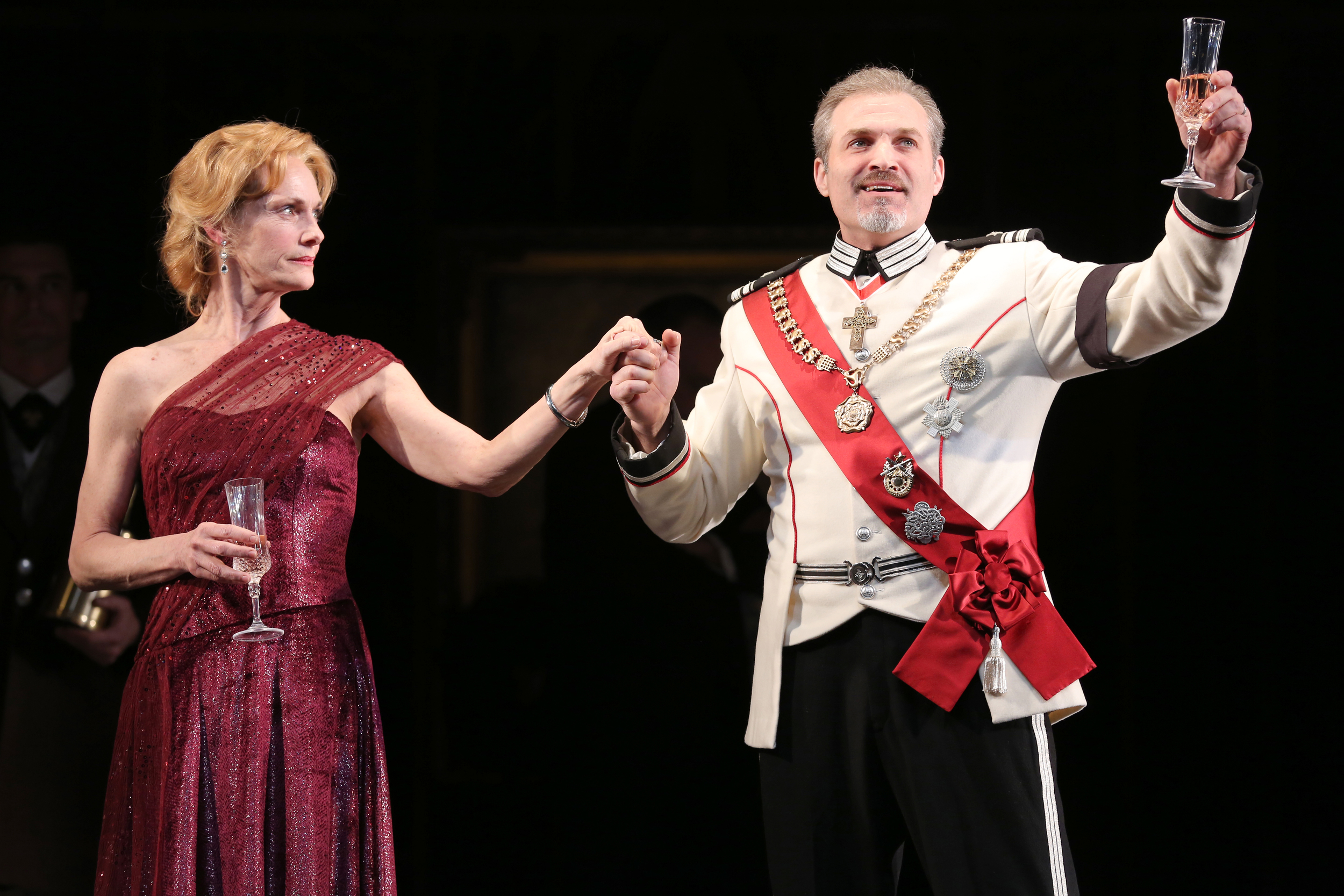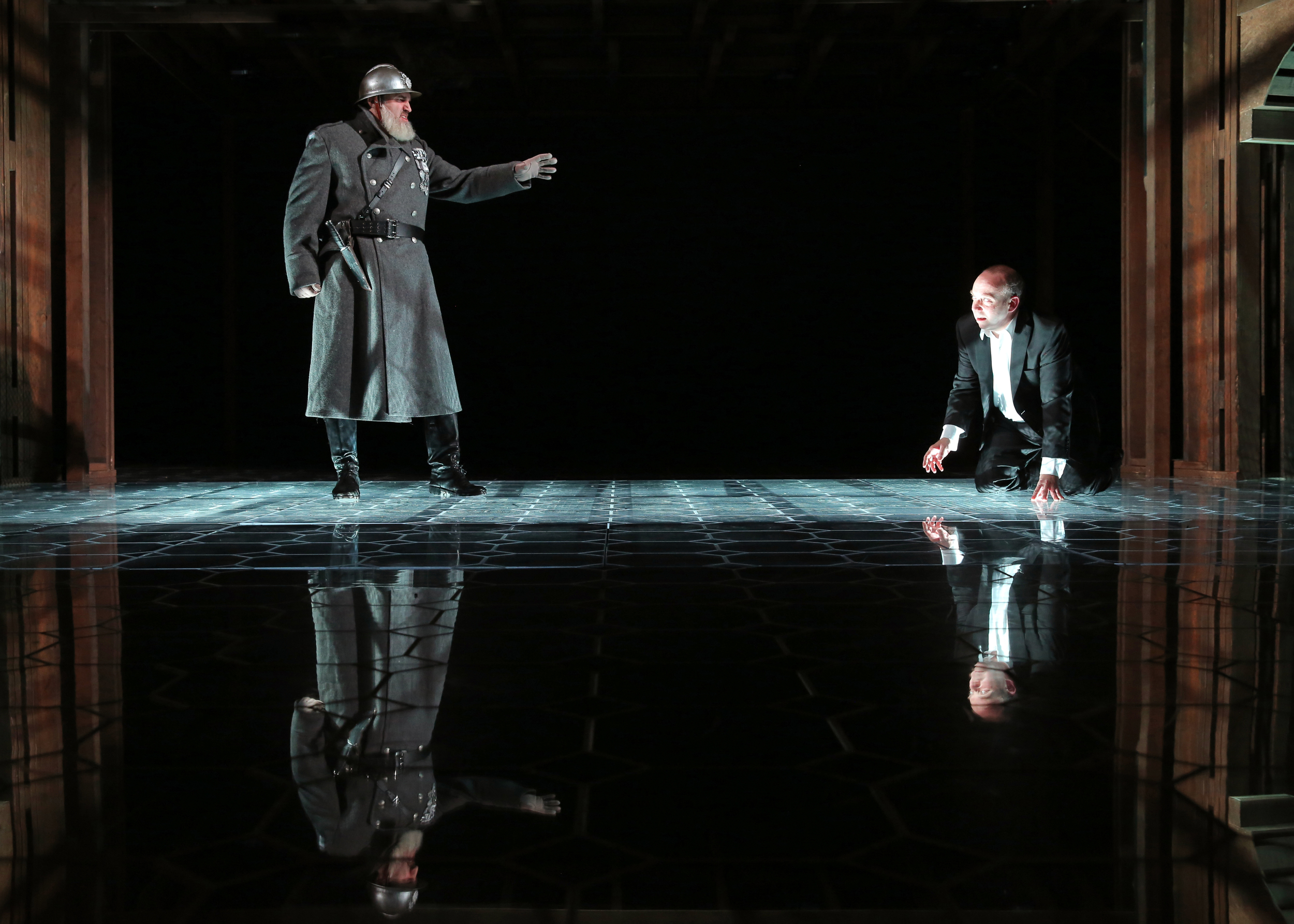In the playbill for Hamlet at the Yale Repertory, directed by James Bundy and starring Paul Giamatti, dramaturg Dana Tanner-Kennedy quotes the critic Jan Kott: “we can only appraise any Shakespearean production by asking how much there is of Shakespeare in it, and how much of us.” Good question. And who is “us,” anyway?
One “us” involved here, of course, is the Yale School of Drama—both Bundy and Giamatti are grads and Bundy is its Dean as well as the Artistic Director of the Yale Rep. A fair number of former students and current students grace this production, so, from that point of view, this Hamlet is “us” in spades. In fact, it might be hard at times to see this production as not about that particular “us.” From that point of view, it’s remarkably successful—the show is sold out*. Kudos, all around. And particularly to graduating student Meredith Ries for her stunning and fascinating set.
But we must also consider Shakespeare and the other “us”—not simply the audience (i.e. the local citizenry and others who have come here to see a name actor of stage and screen enact one of the premiere roles in all of theater), but also, one assumes, the contemporary world in general.
Hamlet, we might say (and Tanner-Kennedy makes that case in the playbill), is always “modern”—and it’s up to “us” (critics, I suppose) to decide if it’s modern in a way that makes sense for the tenor of the times. That said, as a critic I tend to sympathize with Harold Bloom who insists that Shakespeare’s plays would work, even if you cut out all the stage business and simply have the actors speak the lines to the best of their abilities. In fact, Bloom goes further and suggests many a production would be better that way.
The case for “how much Shakespeare,” then, has to do with whether the lines get across. The lines alone make it about “us”—so, “speak the speech, I pray you, as I spoke it to you” and you cannot then be false to the text, and cannot fail to implicate “us.” Now, if this come tardy off or something too much, as Hamlet might say, then we run into problems.
If you know the play, you know I’m cribbing in part from Hamlet’s advice to the players. It’s good advice, and might be extended to other matters the Dane touches not on. On that score, this is a Hamlet that hews, for the most part, to the “temperance” that “begets a clearness” the Prince himself might applaud. In other words—and in Hamlet there are always more “words, words, words”—the play is easy to follow and, despite its length, not overlong. Giamatti is often almost breathless with exertion—you might easily believe he is devoutly wishing for both “rest” and “silence”—and yet he ever finds new modulations in a voice gifted with considerable range.
In the advice scene, Bundy—and it was one of my favorite bits—makes Hamlet’s comments seem windy director’s notes on a performance that hasn’t happened yet. The actors humor him and basically play him for a fool even as he advises them not to let the fools govern the piece. His advice is about how much comedy to let into a tragedy, and how much passion.
Bundy’s production errs a little on both. At times the actors—and Marc Kudisch’s King Claudius is the most remiss in this, though Giamatti would not ‘scape whipping on that score neither—tend to pump up the sobs and tears a bit too much. Contrast that with Patrick Kerr’s First Player who does the “mobled queen” speech as though it’s a bit of vaudeville. Still better and worse, as Gertrude (Lisa Emery) might say. For comic missteps, the Queen's bottle-swilling undercuts the pathos of her lyrical speech describing Ophelia’s death, though one could argue it suits the "Sopranos Go Elsinore" royal couple.
Other thoughts on support: the scenes between Kudisch’s stiff CEO-like Claudius and Tommy Schrider’s unconvincing Laertes make some of Part Two slow going. It’s not just that we aren’t getting our Giamatti—what we are getting isn’t pointed enough to make us care. Jarlath Conroy’s Gravedigger is all he should be and no more; Brooke Parks’ Ophelia is only interesting when she’s gone mad, aided by the great touch of having her robed in her dead father’s bloody button-down; Gerry Ramman’s Polonius uses a masterful sense of timing to give us the comedy embedded in a presumptuous counselor’s demands for dignity; and Austin Durant is perfectly measured as a scholarly and mannerly Horatio.
And what of Giamatti, and “us”? When, early on, the Prince, wracked with sobs over his dead dad, assumes a fetal position, then starts up like a guilty thing when Horatio and the Watch come upon him, we get a real glimpse into this Hamlet. An overgrown baby, an ineffective “manchild” of so many films of today, he berates his would-be lover Ophelia while swaddled in a bathrobe, boxers, and socks (the uniform of the clinically depressed). When he has to lay into his mother on her bed, Giamatti is hunched and pained, often pressing his hands between his legs as though ashamed of himself. The scenes between Hamlet and his father’s Ghost (Kudisch again, and very commanding in the role) are riveting, thanks in part to Lighting (the most excellent Stephen Strawbridge) and Sound (the wondrous Keri Klick). Giamatti plays the first on his knees and the second, in his mother’s bedroom, as though prostrate with emotion at the realization that he can’t be his dad’s avenger, much less his replacement. When we see Hamlet don the Player King’s crown I couldn't help thinking of Charles Laughton as Quasimodo crowned as the King of Fools. This Hamlet is a thing of “shreds and patches.” A fit of hysteria hiding behind “knavery.”
And what of the knavery? I’m of the opinion that Hamlet comes close to madness by trying to be too clever by half, talking himself into fits, we might say. Giamatti’s Hamlet, when at his wit’s end, is likely to mime slitting his throat or to make nutty faces—something for the groundlings. But Giamatti can also be cutting with voice alone and has the means to manifest the thoughtful Hamlet and the heart-eating one as well—his entrance and first scene make that clear. What I’d like more of is Hamlet in a battle of wills against himself—and against “us,” the ever-present audience the Prince carries in his own mind.
Likeable, energetic, frustrated, Giamatti is best as the impatient, resourceful Hamlet who, brilliant and lazy, won't suffer fools gladly. He might, we imagine, be happily playing computer games on the old man’s dime if some ambitious relative hadn’t poisoned the king in his garden. And when this poor fool of a prince has strutted his three hours upon the stage, the military man Fortinbras (Paul Pryce) comes in to mop up.
I’d say this Hamlet’s got “us” right. O cursèd spite!
*Note: though the production is sold out, there is a wait list that begins an hour before each performance: 6:30 for evening shows; 12:30 p.m. for matinees.
William Shakespeare’s Hamlet Directed by James Bundy Starring Paul Giamatti
Composer: Sarah Pickett; Scenic Designer: Meredith B. Ries; Costume Designer: Jayoung Yoon; Lighting Designer: Stephen Strawbridge; Sound Designer: Keri Klick; Fight Director: Rick Sordelet; Vocal Coach: Grace Zandarski; Movement Coach: Erica Fae; Production Dramaturg: Dana Tanner-Kennedy; Casting Director: Tara Rubin; Stage Manager: Geoff Boronda
Yale Repertory Theatre March 15-April 13, 2013





